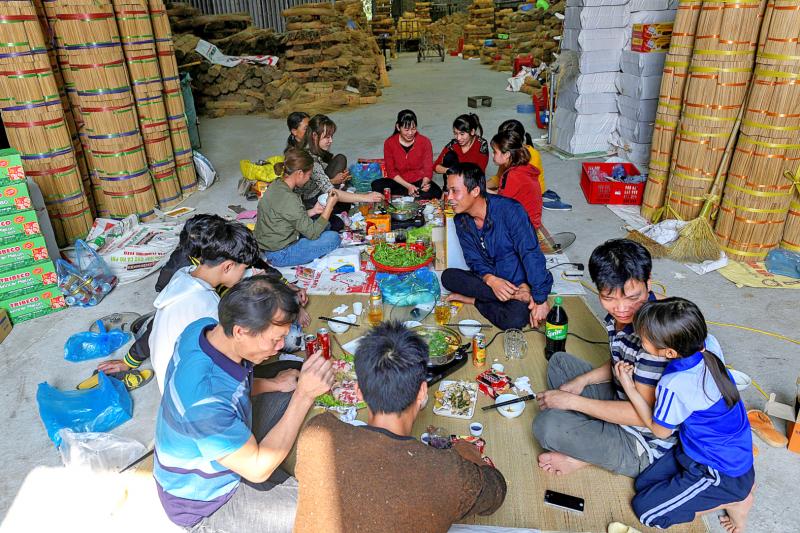Across this village south of Hanoi, otherwise drab patches of ground blaze with color as bundles of magenta-tipped incense sticks are left to dry in the sun before being distributed across Vietnam and to other parts of the world.
Do Thi Oanh, 37, a resident of Quang Phu Cau, recalls from childhood being involved in making incense sticks that are burned in Vietnam during prayers to ancestors or in festivals as well as in cultural and religious rituals around the world.
Now, she is worried about the future of the trade after India imposed curbs on imports and with the added impact of the pandemic and a new wave of infections since last month after the coronavirus had been largely been contained for months.

Photo: Reuters
“We have been producing incense sticks for many generations in this village, but I’m afraid many of us will have to shut down our businesses due to weaker demand,” Oanh said.
Her family business used to export around 15 containers of incense sticks to India a month, but this had fallen to five to six containers after import curbs, she said.
“The coronavirus has also hurt domestic incense consumption a little bit, but demand has picked up ahead of the Lunar New Year,” Oanh said, speaking just before the holidays, known as “Tet” in Vietnam.

Photo: Reuters
Once a cottage industry, most producers in the village now use machines to cut the bamboo used for incense sticks, with the industry providing an income for nearly 3,000 households. The fingers of workers are often stained red by the dye used on the incense sticks.
In 2013, Oanh and her husband opened a workshop to make incense sticks and later borrowed about US$70,000 from the bank to grow their business.
However, when the pandemic started she had to halve her workforce to 10 and cut their hours, before resuming normal operations when orders for the Lunar New Year emerged.
“In the business, there will be up and down times... I can’t do anything but try to figure any way around it,” Oanh said.

GROWING OWINGS: While Luxembourg and China swapped the top three spots, the US continued to be the largest exposure for Taiwan for the 41st consecutive quarter The US remained the largest debtor nation to Taiwan’s banking sector for the 41st consecutive quarter at the end of September, after local banks’ exposure to the US market rose more than 2 percent from three months earlier, the central bank said. Exposure to the US increased to US$198.896 billion, up US$4.026 billion, or 2.07 percent, from US$194.87 billion in the previous quarter, data released by the central bank showed on Friday. Of the increase, about US$1.4 billion came from banks’ investments in securitized products and interbank loans in the US, while another US$2.6 billion stemmed from trust assets, including mutual funds,

Micron Memory Taiwan Co (台灣美光), a subsidiary of US memorychip maker Micron Technology Inc, has been granted a NT$4.7 billion (US$149.5 million) subsidy under the Ministry of Economic Affairs A+ Corporate Innovation and R&D Enhancement program, the ministry said yesterday. The US memorychip maker’s program aims to back the development of high-performance and high-bandwidth memory chips with a total budget of NT$11.75 billion, the ministry said. Aside from the government funding, Micron is to inject the remaining investment of NT$7.06 billion as the company applied to participate the government’s Global Innovation Partnership Program to deepen technology cooperation, a ministry official told the

Taiwan Semiconductor Manufacturing Co (TSMC, 台積電), the world’s leading advanced chipmaker, officially began volume production of its 2-nanometer chips in the fourth quarter of this year, according to a recent update on the company’s Web site. The low-key announcement confirms that TSMC, the go-to chipmaker for artificial intelligence (AI) hardware providers Nvidia Corp and iPhone maker Apple Inc, met its original roadmap for the next-generation technology. Production is currently centered at Fab 22 in Kaohsiung, utilizing the company’s first-generation nanosheet transistor technology. The new architecture achieves “full-node strides in performance and power consumption,” TSMC said. The company described the 2nm process as

Even as the US is embarked on a bitter rivalry with China over the deployment of artificial intelligence (AI), Chinese technology is quietly making inroads into the US market. Despite considerable geopolitical tensions, Chinese open-source AI models are winning over a growing number of programmers and companies in the US. These are different from the closed generative AI models that have become household names — ChatGPT-maker OpenAI or Google’s Gemini — whose inner workings are fiercely protected. In contrast, “open” models offered by many Chinese rivals, from Alibaba (阿里巴巴) to DeepSeek (深度求索), allow programmers to customize parts of the software to suit their